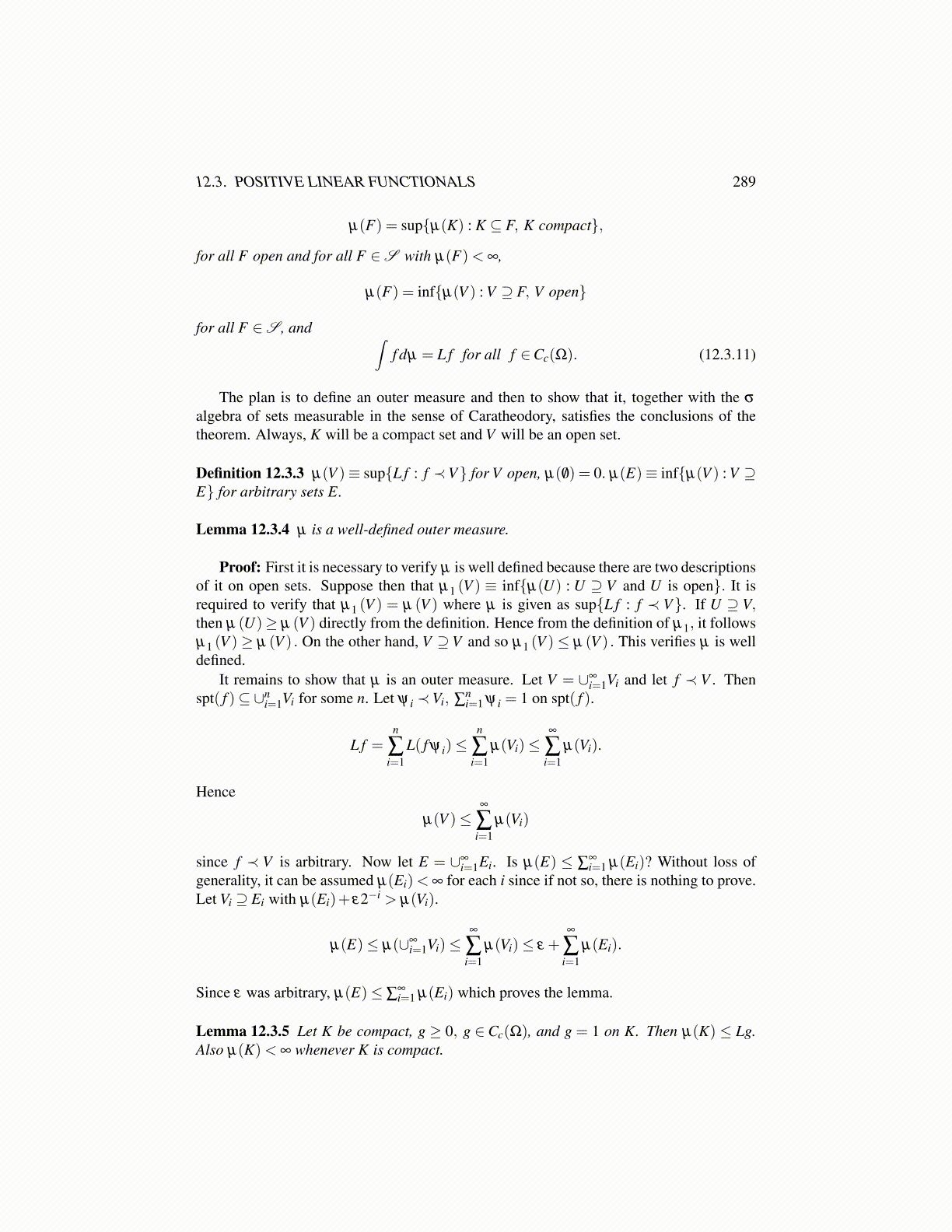
12.3. POSITIVE LINEAR FUNCTIONALS 289
µ(F) = sup{µ(K) : K ⊆ F, K compact},
for all F open and for all F ∈S with µ(F)< ∞,
µ(F) = inf{µ(V ) : V ⊇ F, V open}
for all F ∈S , and ∫f dµ = L f for all f ∈Cc(Ω). (12.3.11)
The plan is to define an outer measure and then to show that it, together with the σ
algebra of sets measurable in the sense of Caratheodory, satisfies the conclusions of thetheorem. Always, K will be a compact set and V will be an open set.
Definition 12.3.3 µ(V )≡ sup{L f : f ≺V} for V open, µ( /0) = 0. µ(E)≡ inf{µ(V ) : V ⊇E} for arbitrary sets E.
Lemma 12.3.4 µ is a well-defined outer measure.
Proof: First it is necessary to verify µ is well defined because there are two descriptionsof it on open sets. Suppose then that µ1 (V ) ≡ inf{µ(U) : U ⊇ V and U is open}. It isrequired to verify that µ1 (V ) = µ (V ) where µ is given as sup{L f : f ≺ V}. If U ⊇ V,then µ (U)≥ µ (V ) directly from the definition. Hence from the definition of µ1, it followsµ1 (V ) ≥ µ (V ) . On the other hand, V ⊇ V and so µ1 (V ) ≤ µ (V ) . This verifies µ is welldefined.
It remains to show that µ is an outer measure. Let V = ∪∞i=1Vi and let f ≺ V . Then
spt( f )⊆ ∪ni=1Vi for some n. Let ψ i ≺Vi, ∑
ni=1 ψ i = 1 on spt( f ).
L f =n
∑i=1
L( f ψ i)≤n
∑i=1
µ(Vi)≤∞
∑i=1
µ(Vi).
Hence
µ(V )≤∞
∑i=1
µ(Vi)
since f ≺ V is arbitrary. Now let E = ∪∞i=1Ei. Is µ(E) ≤ ∑
∞i=1 µ(Ei)? Without loss of
generality, it can be assumed µ(Ei)< ∞ for each i since if not so, there is nothing to prove.Let Vi ⊇ Ei with µ(Ei)+ ε2−i > µ(Vi).
µ(E)≤ µ(∪∞i=1Vi)≤
∞
∑i=1
µ(Vi)≤ ε +∞
∑i=1
µ(Ei).
Since ε was arbitrary, µ(E)≤ ∑∞i=1 µ(Ei) which proves the lemma.
Lemma 12.3.5 Let K be compact, g ≥ 0, g ∈Cc(Ω), and g = 1 on K. Then µ(K) ≤ Lg.Also µ(K)< ∞ whenever K is compact.